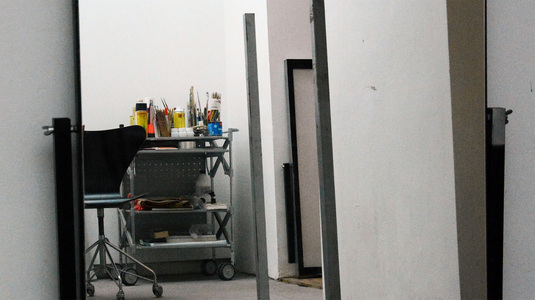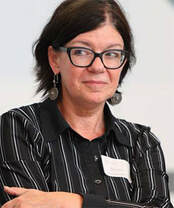|
CV
With her exhibitions, projects and urban interventions Barbara Holub addresses current societal and urban issues searching for shared values of living together. She creates performative situations for urban acting - for returning the responsibility to the individual, addressing the dichotomy of personal interests and the common wellbeing. Rather than propagating activism in a direct sense, Barbara Holub discretely encourages the individual responsibility of the participants – as „silent activism“. In this way the various audiences between the art context /institutions and the public urban space become co-authors. Already in the 1990s Barbara Holub invited employees of companies (like the Austrian Tobacco Factories, Bene or Porsche) to investigate the borders between personal concerns and the interests of the companies, which she transformed into installations in the companies as well as in art institutions (e.g. Secession Vienna) and galleries (e.g. Grita Insam Gallery), thus communicating between these diverse audiences. In 1999 she founded transparadiso with the architect/ urbanist Paul Rajakovics as transdisciplinary practice between art, artistic urban intervention, architecture and urbanism, between practice and theory. Barbara Holub was president of the Secession Vienna (2006-2007) and a member of the Public Art Committee of Lower Austria (2005-2007). Barbara Holub received the Austrian National Art Award 2018 (with Paul Rajakovics); Otto-Wagner-Urban Design Prize (2006, transparadiso); Schindler Grant, MAK Center for Art and Architecture, Los Angeles (2003). Phd on "Direct Urbanism. The Role of Art and Artistic Strategies for Societally Engaged Urban Planning." (Vienna University of Technology, 2018) for which she received the Research Award of the Austrian Chamber of Architects in 2022. Barbara Holub serves on international boards and juries: Art and Public Sphere Journal (advisory board), Public Art Innovation Fund, City of Stuttgart (jury); Expert Committee of the 4th Ural Industrial Biennial, Ekaterinburg (RUS, 2017); external examiner for "Situated Practice" /The Bartlett, London (2019-2022). Barbara Holub has initiated long term projects like „The Blue Frog Society“ (which she presented e.g. at the 64th UN NGO/DPI Congress in Bonn and in the exhibition „The Future of the Future“ / DOX Center for Contemporary Art in Prague and recently opened a new chapter inviting minority cultures to pay a state visit to the BFS, in "CrossSections", Kunsthalle Exnergasse). Since 2017 she has been working on "Harbour for Cultures" in Trieste (with trieste contemporanea), in which the Porto Vecchio (Old Harbour) serves as concrete situation for a production of desires – for establishing and rediscovering non-commercial values and visions of living together. Currently we (trieste contemporanea, transparadiso and Betta Porro) aim at establishing the Center for Harbour for Cultures as international contemporary art institution in Porto Vecchio. In 2020-2021 she realized NORMAL - a project for Graz Culture City 2020 - with transparadiso. Currently she is engaged in the EU-Project SPACEX and has been directing WE PARAPOM! - a flagship project for the European Capital of Culture 2025 in Chemnitz (2021-2023), among others. Public collections: Lentos Linz; Zorlu Collection Istanbul; Artothek/ Museum of the 21st Century, Vienna; Ursula Blickle Video Archive; Photography Collection/ Museum der Moderne Salzburg, and others. ...................................................................................................................................................................... |
Dr. Barbara Holub Gr.Mohrengasse 34/3 A-1020 Wien Austria / Europe t +43 1 946.07.34 m +43 699 102.79.217 e [email protected] w www.transparadiso.com www.missingthings.org www.urban-matters.org weparapom.eu Portfolio:
teaching experience + publications
PODCAST SECESSION, Vienna:
Barbara Holub with Rainer Fuchs (Senior curator, MUMOK, Vienna) https://secession.at/podcast_barbara_holub_rainer_fuchs | ||||||||||||
|
In ihren Ausstellungsprojekten und urbanen Interventionen thematisiert Barbara Holub aktuelle gesellschaftliche sowie urbane Fragestellungen und hinterfragt aktuelle und tradierte Wertvorstellungen. Die Künstlerin schafft performative Situationen für urbanes Handeln und propagiert damit keinen Aktivismus im direkten Sinne, sondern regt vielmehr diskret die individuelle Verantwortung der TeilnehmerInnen an. Damit werden diese zu Co-ProduzentInnen der Kunstwerke. Bereits in den 1990er Jahren lud Barbara Holub MitarbeiterInnen von Unternehmen wie Bene oder Porsche dazu ein, im Rahmen ihrer Kunstprojekte die Grenzen zwischen persönlichen Anliegen und jenen des Unternehmens auszuloten.
1999 gründete Barbara Holub mit Paul Rajakovics (Architekt und Urbanist) transparadiso, eine transdisziplinäre Praxis zwischen Kunst, Architektur, künstlerisch-urbaner Intervention und Urbanismus. Die Frage nach der Verantwortung des Individuums in Bezug auf die Gesellschaft, die zwischen persönlichen Interessen und dem Gemeinwohl oszilliert, thematisiert Barbara Holub in vielfältigen Projekten. Dafür gründete sie u.a. die „Blue Frog Society“, die auch am 64th UN NGO/DPI Congress in Bonn oder an der Ausstellung „The Future of the Future“ im DOX Center for Contemporary Art in Prag teilnahm. Seit 2017 arbeitet sie an "Harbour for Cultures" in Trieste, einem längerfristigen Projekt, in dem die Situation des Porto Vecchio (Alten Hafens) als Anlass dient, um nicht-ökonomische Werte des Zusammenlebens für neue Gemeinschaften zu etablieren. Derzeit arbeitet sie u.a. am EU-Project SPACEX und leitete WE PARAPOM! - ein flagship project für die Kulturhauptstadt Europas Chemnitz 2025 (2021-2023). Öffentliche Sammlungen Lentos Linz; Zorlu Collection Istanbul; Artothek/ Museum des 21.Jahrhunderts, Wien; Ursula Blickle Video Archiv; Photosammlung des Bundes/ Museum der Moderne Salzburg, und andere. Barbara Holub war Präsidentin der Secession Wien (2006-2007), Sie erhielt den Österreichischen Kunstpreis 2018 für Bildende Kunst (mit Paul Rajakovics); 2022 den Forschungspreis der Österreichischen Kammer für Ziviltechniker für ihr Doktorat "Direkter Urbanismus. Die Rolle von Kunst und künstlerischen Strategien für gesellschaftlich engagierte Stadtplanung". Das Schindler-Stipendium des MAK, Los Angeles, 2003; Outstanding Artist Award für Künstlerische Fotografie, 1999. ........................................................................................................................................................................ |
Short CV_dt.
| ||||||||||||

